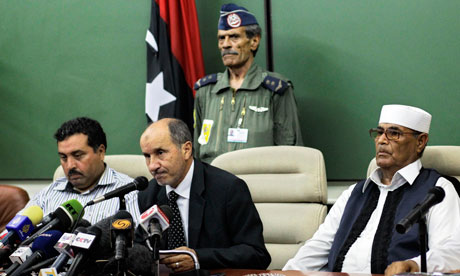Libyan rebels fear rift after death of Abdel Fatah Younis
![]()
 Abdul Mustafa Jalil announces the death of Younis – the Libyan rebels’ chief of army staff. Photograph: Sergey Ponomarev/AP
Abdul Mustafa Jalil announces the death of Younis – the Libyan rebels’ chief of army staff. Photograph: Sergey Ponomarev/AP
The death of the Libyan rebels’ chief of army staff, Abdel Fatah Younis, has raised fears of a rift within opposition forces amid speculation that he may have been killed by gunmen on his own side.
The president of the National Transition Council (NTC), Abdul Mustafa Jalil, announced on Thursday night that Younis had been assassinated by pro-Gaddafi agents. But the lack of detail, and the fact that earlier that day Younis had been arrested on the orders of Jalil, have raised questions about the circumstances of his death.
Jalil said that rebels had arrested the head of the group behind the attack but the bodies of Younis, Muammar Gaddafi‘s former interior minister, and two colonels also killed in the alleged ambush have not been found.
The rebels said earlier on Thursday that Younis had been arrested on suspicion that his family might still have ties to the Gaddafi regime. Rumours swirled that he was involved in unauthorised contact with the administration he dramatically abandoned in February or had even helped to supply Gaddafi troops with weapons.
Before the announcement of his death, armed men declaring their support for Younis appeared on the streets of Benghazi claiming they would use force to free him from NTC custody.
Minutes after Jalil’s statement at a chaotic late-night press conference at a hotel in Benghazi, gunfire broke out in the street outside. Members of Younis’s tribe, the Obeidi, one of the largest in the east, fired machine guns and smashed windows, forcing security guards and hotel guests to duck for cover.
A tribal split within the opposition could prove catastrophic and plays on western fears of a civil war over Libya‘s oil resources – a possibility raised by Gaddafi.
The discord comes a day after the foreign secretary, William Hague, said Britain would recognise the NTC as the legitimate government of Libya and painted a rosy picture of the opposition forces in Libya, praising their “increasing legitimacy, competence and success”.
Adding to the confusion, a security officer, Fadlallah Haroun, told the Associated Press before Jalil’s announcement that security had found three badly burned people. Two of them were dead and one was unconscious, Fadlallah said, adding that one was known to be Younis, though they didn’t know which one.
Jalil said Younis had been “summoned” for questioning on “a military matter” but had not yet been questioned when he was killed. Jalil said it was “with regret” he had to announce the death of Younis and called him “one of the heroes of the 17th of February revolution”.
Younis was not universally trusted within opposition ranks. Many were suspicious of his past links to the Gaddafi regime and troops in the besieged city of Misrata have conspicuously refused to accept orders from him, to the extent of insisting that their fighters are not part of the Benghazi-controlled national rebel army.
During an interview in April Gaddafi’s daughter, Aisha, suggested that Younis was still loyal to her father and declined to answer when asked if the former interior minister was still in touch with her family.
Younis reportedly nearly came to blows with his rival for the army command, Klalifa Hefter, during a meeting in late March. For much of that month both men claimed to be in command of the ragtag rebel forces as they raced west towards Tripoli, only to be thrown back towards Benghazi in chaos and confusion.
By April Younis had won the political battle inside the NTC and was confirmed as chief of staff. But he failed to use his new position to bring victory on the battlefield. Since April the frontline has remained largely in stalemate despite heavy Nato bombing of government forces around the key oil town of Brega.
Younis had been one of Gaddafi’s most trusted officials and confidants. The general’s friendship with Gaddafi dated from 1969 when he joined a group of fresh-faced army officers in deposing Libya’s king.
But when riots came to the streets of Benghazi in February he dramatically switched sides, joining the rebels and bringing the city’s interior ministry military brigade with him.
Related Articles
Back on Cairo’s Streets
![]()
What’s the Use of a Revolution That Doesn’t Change Anything? The Muslim Brotherhood had sworn not to seek the Egyptian
Obama’s Faltering Legacy
![]()
Spin, Deceit and A Culture of Prurience President Obama’s disputed pronouncement that the Syrian government has used chemical weapons and
Fabricar pretextos
![]()
Editorial de Granma La Revolución Cubana ha sido objeto de cientos de campañas de desinformación, generalmente orquestadas por el gobierno


